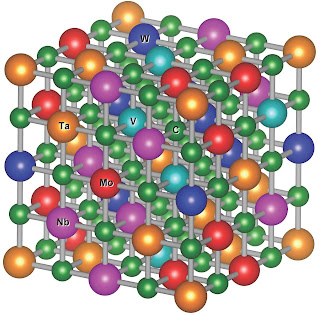Scientist Find The Hardest Material Ever
The Hardest Material Ever
Material scientists at Duke University and UC San Diego have discovered a new group of carbides. Carbides are compounds made from carbon and a less electronegative element.
Alloys can be difficult to make. This is because materials naturally try to expel impurities. In some cases, the impurities accumulate at grain boundaries and this makes the boundaries very weak. This ruins the alloy and makes it of little use.
Few carbides exist that have three or more elements because it is hard to determine which alloys will end up forming a stable material. Getting a stable carbide is only the first step however because after that, you want to make sure your material has a few properties that make it useful.
The team of materials scientists announced that the have found carbides that join carbon with five different metal elements at once.
These materials were predicted computationally by researchers at Duke university and then they were successfully created at UC San Diego.
They rely on their high entropy for stability. It is very hard to decide which combinations of metals will work because there are 91 metals to choose from. The team therefore started with 8 metals that are known to create strong carbide compounds. They then used energy considerations to predict which combinations would give the strongest compounds. MoNbTaVWC5 (molybdenum, niobium, tantalum, vanadium and tungsten) was the stand out compound from their predictions.
The new class of carbides found are expected to be the hardest materials with the highest melting points ever made. They are also made of relatively cheap metals and so the new materials may soon be widely used.
Thanks for reading. If you enjoyed this post or any of my others, follow and subscribe to my blog. Feel free to discuss anything related to this post or ask questions in the comments below.
Check Out My Other Posts On Materials Science (link to all posts)
Did you see my previous post? Click the link below to check it out

Comments
Post a Comment